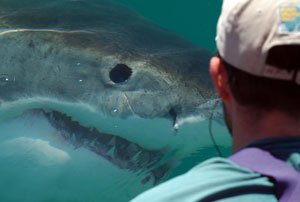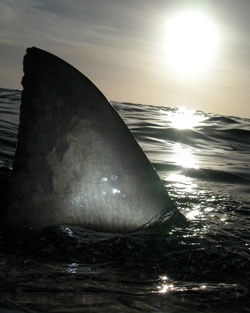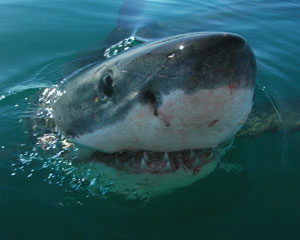Sharm el Sheikh deaths: Don’t blame the sharks
Sharks are natural predators – but reports of “shark attacks” in the Red Sea are both misleading and alarmist, writes marine biologist Michael C Scholl.

The internationally-acclaimed tourist destination, Sharm el Sheikh – on the southern tip of the Sinai Peninsula – has seen its share of unfortunate publicity recently with four people bitten by sharks and a fifth victim bleeding to her death last Sunday.
Printing ‘Shark Attack’ in bold red letters on the front page of any newspaper will inherently increase sales. Amazing how one shark-related incident on the antipodes of the planet will make headline news at home, while at the same time a natural disaster killing thousands will often be relayed to page 3.
Sharks do not target humans, never have and never will. The myth of man-eating sharks does not exist. But sharks are indeed predators in their natural environment.
Humans have only started using our oceans for fun during the past century, and water sports, such as surfing and diving, have been around for less than 50 years. Sharks however have been around for 400 million years. What are we to a shark? They do not know what we are, and animals fear the unknown.
Sharks do not target humans, never have and never will.
We should prefer the term ‘shark bite’ to shark attack as no premeditation is involved in these rare encounters. And shark bite is not a science. No specialist or scientist will ever be able to tell you the precise reason why any person has been bitten by a shark, even less why five people have been bitten by sharks within one week.

One thing is for certain – the Mossad had nothing to do with it…in a way, that is a shame, as nobody could blame sharks any more at least.
Forensic science will help in the identification of which shark species have been involved… and maybe an idea about number of individuals involved. All the reasons published in the various media around the world will always just remain hypothesis and theories.
Most reports agree that two different shark species were involved in these incidents: Oceanic Whitetip and possibly Mako sharks. These are both pelagic species, occurring usually in deep waters far away from the shallow waters preferred by people.
But the topography of the seafloor drops off to great depth just a few hundred metres from the shore in many places along the coastline of Sharm el Sheikh. Hence these shark species are never that far away.
Theories and hypotheses
Several theories have been used to explain what could have triggered these shark bites. One such theory is that commercial boats transporting sheep to supply the needs for the Islamic holiday, Eid Al-Adha, on 16 November were dumping sheep carcasses overboard which could have drifted close to shore.
Another hypothesis is that sharks have been fed by unscrupulous diving companies which have attracted sharks for their clients. Sharks are also often said to change their habits and come closer to shore as the oceans are depleted of fish – their natural prey – by our exaggerated and uncontrolled over-fishing practices, hence driving sharks into unusual areas looking for food.

The events in Egypt are extraordinary and most definitely unusual – unfortunately reminding people of the horror movie Jaws which remains engraved in everyone’s memory. This fiction movie remains one of the most successful marketing campaigns in having given sharks this reputation as man-eating serial killing machines – an image that could not be further from the truth.
Worldwide there are between 80 and 120 shark bites a year, of which between five and 15 are fatal. Sharks remain one of the smallest causes of fatality for humankind, outnumbered by hippos, crocodiles, bees and mosquitos. Chairs kill more people than sharks!
Meanwhile, we are slaughtering between 70 and 100 million sharks worldwide, mostly just for their prized fins, which are used for cooking a traditional dish in some Asian cuisines, mainly in China – shark fin soup. Processed shark fins sell for up to $400 per kilogram in Hong Kong whereas shark meat fetches only one to ten dollars for the same weight. Many shark species have declined by up to 95 per cent of their population during the past 40 years alone.
Sharks remain one of the smallest causes of fatality for humankind, outnumbered by hippos, crocodiles, bees and mosquitos. Chairs kill more people than sharks!
Sharks have been around much longer than most vertebrates, and occupy a special niche in the world oceans’ ecosystems: they are super-predators and are at the top of all marine food chains, along with the orcas. Hence they have a very important role in the balance of the oceans’ ecosystems, and disrupting this delicately-regulated balance could have catastrophic repercussions for the entire ecosystem.
The Chinese can be blamed for creating the demand for shark fins, but every country that has access to the ocean is to blame for supplying them with the product. The UK is 19th on a list of the countries with the highest shark landings.
Michael C Scholl is a marine biologist and shark specialist with whitesharktrust.org
-
Latest news
-
Police try to shut down right-wing event as Nigel Farage speaks3m

-
‘Many things Netanyahu has done I disagree with, but I’m not giving up on Israel’, says top-ranking Democrat4m

-
Could US House be about to vote on Israel, Ukraine aid bill?2m

-
Number of people out of work due to long-term sickness at record high3m

-
Creating deepfake porn to be made a criminal offence after C4 investigation6m

-




